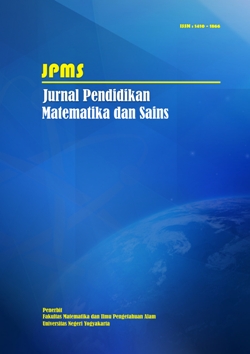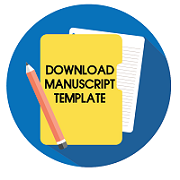Pengembangan LKPD Berbasis Literasi Konten Kearifan Lokal pada Materi Asam dan Basa
DOI:
https://doi.org/10.21831/jpms.v11i1.49875Abstrak
Penelitian pengembangan ini dilakukan dengan tujuan: (1) menghasilkan produk Lembar Kerja Peserta Didik (LKPD) materi asam basa yang mengacu pada model pembelajaran Student Team Achievement Divission (STAD) berbasis literasi konten kearifan lokal sesuai dengan kekhasan yang dibuat; (2) mengetahui kelayakan LKPD yang dihasilkan berdasarkan penilaian lima guru kimia SMA; (3) mengetahui respon peserta didik terhadap produk melalui uji keterbacaan oleh peserta didik. Prosedur pengembangan mengacu pada model pengembangan 4D. Tahap yang dilakukan antara lain: (1) Define (pendefinisian); (2) Design (perancangan); (3) Development (pengembangan); (4) Disseminate (penyebaran). Hasil validasi oleh dosen ahli pembelajaran kimia LKPD ini layak digunakan setelah direvisi berdasarkan saran penilai. Hasil penilaian kualitas produk LKPD oleh reviewer memperoleh persentase keidealan 88,00% dan hasil uji keterbacaan oleh peserta didik memperoleh persentase keidealan sebesar 83,31%, sehingga secara keseluruhan LKPD ini layak digunakan pada pembelajaran kimia.
Kata Kunci: LKPD, STAD, literasi, kearifan lokal, asam basa.
Referensi
Cahyana, U., Supatmi, S., Erdawati & Rahmawati, Y., 2019. The Influence of Web-Based Learning and Learning Independence toward Student's Scientific Literacy in Chemistry Course. International Journal of Instruction, 12(4), 655-668. doi:http://dx.doi.org/10.29333/iji.2019.12442a.
Sadhu, S. & Laksono, E. L., 2018. Development and Validation of an Integrated Assessment for Measuring Critical Thinking and Chemical Literacy in Chemical Equilibrium. International Journal of Instruction, 11(3), 557-572. doi:http://dx.doi.org/10.12973/iji.2018.11338a.
Wulaningrum , S. & Priyambodo, E., 2016. Development of Teaching Aids Based on Local Wisdom as a Chemistry Learning Media for Senior High School' Students. International Jurnal of Education Research Review, 1(1).
Prima, R. B., Bernard, M. & Rohaeti, E. E., 2019. Developing Interactive Learning Media for School Level Mathematics through Open-ended Approach Aided by Visual Basic Application for Excel. Journal on Mathematics Education, 10(1), 59-68. doi: https://doi.org/10.22342/jme.10.1.5391.59-68.
Petterson, M. N. et al., 2019. Eliciting student thinking about acid–base reactions via app and paper–pencil based problem solving. Chem. Educ. Res. Pract., 21, 878-892. doi: https://doi.org/10.1039/C9RP00260J.
Sheppard, K., 2006. High school students' understanding of titrations and related acid-base phenomena. Chemistry Education Research and Practice, 7(1), 32-45. doi: http://dx.doi.org/10.1039/B5RP90014J
Schmidt-McCormack, J. A. et al., 2019. Analysis of the role of a writing-to-learn assignment in student understanding of organic acid–base concepts. Chem. Educ. Res. Pract., 20(2), 383-398. doi: https://doi.org/10.1039/C8RP00260F
Ekantini, A. & Wilujeng, I., 2018. The Development of Science Student Worksheet Based on Education for Environmental Sustainable Development to Enhance Scientific Literacy. Universal Journal of Educational Research, 6(6), 1339-1347. doi: http://dx.doi.org/10.13189/ujer.2018.060625
Abdurrahman, Romli, S., Distrik, I. W. & Herlina, K., 2020. Development and Validation of Open Ended Based on Worksheet for Growing Higher Level Thinking Skills of Students. European Journal of Educational Research, 9(2), 445-455. doi: https://doi.org/10.12973/eu-jer.9.2.445
Novicki, A., Hill, J. L. & Canelas, D. A., 2017. Cooperative learning in organic chemistry increases student assessment of learning gains in key transferable skills. Chem.Educ.Res.Pract, 18, 441-456. doi: https://doi.org/10.1039/C7RP00014F
Widoyoko, E. P. (2011). Teknik Penyusunan Instrumen Penelitian. Yogyakarta: Pustaka Belajar.
Unduhan
Diterbitkan
Cara Mengutip
Terbitan
Bagian
Lisensi
Jurnal Pendidikan Matematika dan Sains allows readers to read, download, copy, distribute, print, search, or link to its articles' full texts and allows readers to use them for any other lawful purpose. The journal allows the author(s) to hold the copyright without restrictions. Finally, the journal allows the author(s) to retain publishing rights without restrictions
- Authors are allowed to archive their submitted article in an open access repository
- Authors are allowed to archive the final published article in an open access repository with an acknowledgment of its initial publication in this journal

This work is licensed under a Creative Commons Attribution-ShareAlike 4.0 Generic License.





